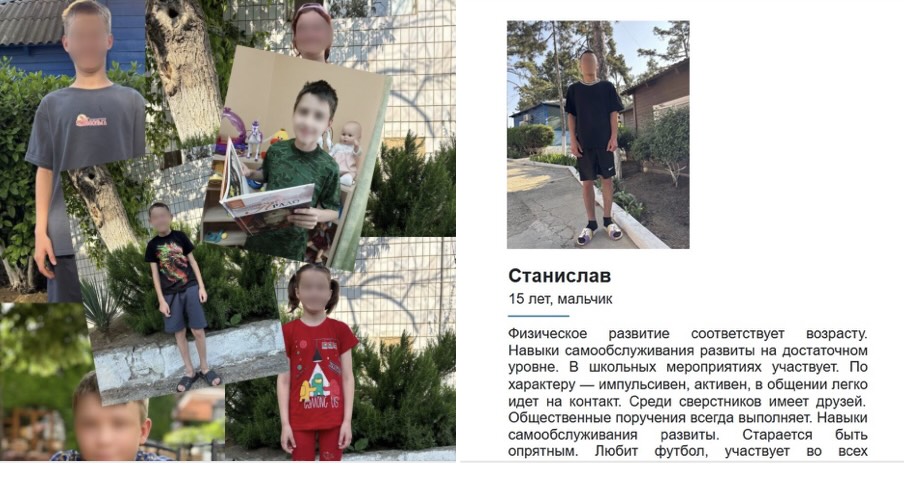A digital platform operated by the self-proclaimed “Ministry of Education and Science of the Luhansk People’s Republic” (LNR) has come under international scrutiny following revelations that it contains profiles of Ukrainian children available for adoption. The profiles include photographs, personality traits, and in some cases, filters for eye and hair colour.
The head of the NGO Save Ukraine, Mykola Kuleba, who has been actively involved in efforts to repatriate abducted children, disclosed the existence of the online catalogue earlier this week. According to Kuleba, the database is structured to allow users to browse and select children by appearance and temperament, with descriptors such as “obedient” and “calm” prominently displayed.
“They describe children as if they were goods for sale,” Kuleba wrote on Facebook. “You can filter them by gender, eye colour, even hair colour. This is not an adoption process. It is child trafficking—openly and systematically facilitated by occupation authorities.”
The children listed are reportedly from the Luhansk region and held Ukrainian citizenship prior to Russia’s 2022 full-scale invasion. Many were taken from families killed or separated by the occupation, and in some cases, Russian documentation was issued to legalise the children’s adoption within the Russian Federation.
Kuleba described the platform as both a mechanism for forced assimilation and a public repository of evidence of war crimes. “When the Russians demand a list of abducted Ukrainian children during negotiations, we could simply hand over this website maintained by their own so-called ministry,” he stated. “Their crimes are being documented by themselves.”
Photographs of the website, shared via social media by Save Ukraine, show the adoption interface offering filtering options such as age, eye colour, hair type, and gender—similar to commercial e-commerce platforms.
The revelations come amid broader concerns about the fate of thousands of children removed from Ukrainian territories since the beginning of the invasion. According to research by a team of investigators at Yale University, approximately 35,000 Ukrainian children are believed to be missing and are either being held in Russia or in Russian-controlled areas. Many of these children, the report states, have been transferred to military training centres, placed in Russian orphanages, or adopted by Russian families.
Elon Musk’s Spending Cuts Halt Efforts to Rescue Abducted Ukrainian Children
The Russian government has previously claimed that the relocations are humanitarian in nature, designed to protect orphans and abandoned children from conflict. Ukrainian officials and international monitors have rejected this characterisation, asserting that the removals constitute illegal deportation and forced adoption, in violation of international humanitarian law.
Legal experts have pointed to the Geneva Conventions and the Rome Statute of the International Criminal Court (ICC), both of which prohibit the transfer of protected persons from occupied territory. The deportation of children has already formed the basis of previous ICC arrest warrants issued against Russian officials.
The catalogue’s existence may further substantiate such allegations. Unlike covert operations or unverified witness accounts, this case centres on an active and publicly accessible database hosted by a quasi-governmental body established under Russian occupation. Human rights advocates have warned that this could represent systematic state involvement in population transfer.
“This is no longer a matter of isolated incidents,” Kuleba noted. “It is institutionalised. It is documented. And it is ongoing.”
The Save Ukraine organisation has played a central role in locating and returning children from Russian custody. In coordination with Ukrainian authorities, international NGOs, and families of missing children, the group monitors known adoption networks and liaises with partner organisations to track removals and relocations.
https://eutoday.net/volodymyr-zelensky-praises-war-crimes-charges-against-putin-lvova-belova/


